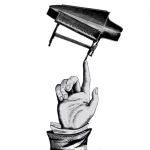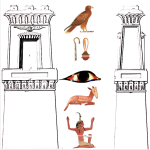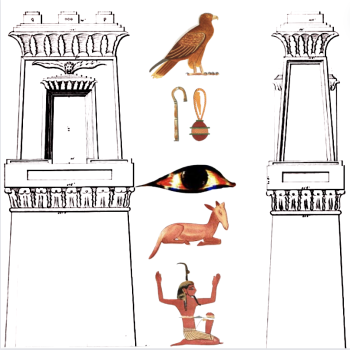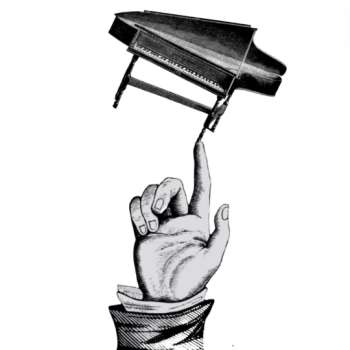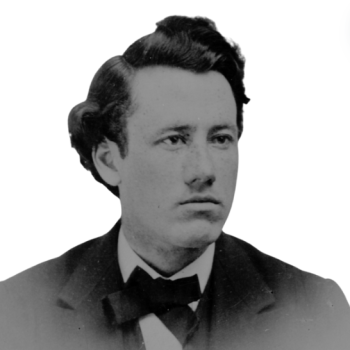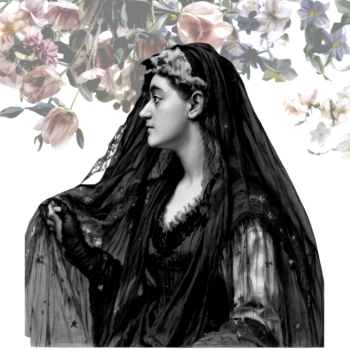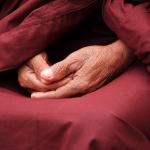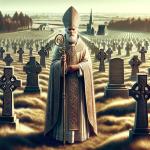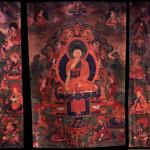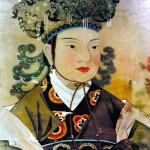GUNS AND ROSES.[1]
First week of September 1875
Judge and Castle knocked on the door the of apartment at the summit of a flight of stairs at 46 Irving Place. The strong odor of tobacco was bleeding into the hallway from beneath the cracks of the front door.[2]
“Come in.”
They entered an ordinary, if somewhat disorderly, looking room, that was littered with books, papers, and oriental tapestries.[3] As they made their way into the main parlor, Judge and Castle stopped to examine the small portrait in the oval frame hanging on the wall. The young lawyers both agreed that the man in the picture was dressed like an Elizabethan nobleman of sorts.
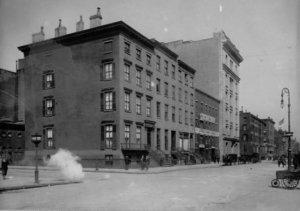
Irving Place & 17th Street. (View from 46 Irving Place looking uptown toward 18th Street.)[4]
“He’s wearing a rather sinister expression, wouldn’t you say?” said Castle. “Is it just my imagination, or are his eyes glistening?”
“Look,” said Judge. “A rose has been forced between the glass and the picture mat.”
Judge and Castle exchanged looks before taking their seats. They found a spot at the large table where a homeless revolver idled, seemingly unnoticed.
“Is it loaded?” Castle whispered to Judge.
“How should I know?”
Castle picked up the gun and examined it. “It’s not loaded.”
Blavatsky, who sat directly across from them, shot Castle a squinting feline gaze.
Colonel Henry Steel Olcott, whom Judge and Castle knew from City Hall, was among the more prominent thinkers presently encircling Blavatsky. There was Horace McMurtrie, who told about his experience with Thayer. Also present was Signor Bruzzesi, “Il Conte,” an artist who was once the secretary to Italian revolutionary, Giuseppe Mazzini. Charles Sotheran was there, along with his friend, a Unitarian Minister named James Henry Wiggin.[5] Born in 1847, in Surrey, England, Sotheran was a relative of the famous Sotheran booksellers of London. In 1874 he came to America, where he worked at The New York World.[6] He was also connected with Sabin and Sons, booksellers, New York, and their journal The American Bibliopolist. An emotional and unbalanced man, his temperament was something of a liability to friends.[7]
Olcott and the assembly were discussing some of the propositions of Spiritualism which were exciting public attention. Much was said of the recent discoveries in Egypt and the Orient, and these savants took no small delight in hypothesizing the true meaning of the hieroglyphics.
“One thoroughly acquainted with the signs and symbols used by the magicians of Egypt, can again accomplish many of the strange and apparently miraculous acts performed by them!” said one of the savants.
Castle, who was only half-listening, continued to fumble the pistol—slowly cocking it, and watching the revolution of the barrel. Every now and then it caught at half-cock, though he could not fathom why.
“Be careful,” said Blavatsky in a rather coarse, but not unpleasant contralto voice. “You will hurt yourself with that pistol.”
“Why,” asked Castle, “what is the matter with it?”
“Nothing,” Blavatsky replied. “It is in perfect order, but sometimes John, in a spirit of mischief, meddles with its working and it catches. If you are not careful, it may suddenly snap and hurt your fingers.”
“Who is John, and where is he?” asked Judge.
“John is a knight,” said Blavatsky. “A knight who lived during the time of Queen Elizabeth. He is often with me.” Blavatsky pointed to the small oval frame hanging on the wall. “That is he.”
“Why is the rose there?” asked Castle.
“It comes itself,” Blavatsky replied, gently tapping one of her feet. (It was a quirk which manifested when she was thinking intently.)[8] “Sometimes the rose is there,” she said, “and then again, the rose is suddenly removed.”[9]
Around midnight, after a conversation of several hours, the company began to break up, talking with each other very graciously as they did so.
Blavatsky reached the end of the table where Judge and Castle were seated.
“While I have never had an opportunity to test the so-called power of looking into the future, or of calling up the past, I have always felt much interest in it,” said Castle. “I would be very much pleased if you chose to give some exhibition of your power.”[10]
“Of course, dear,” said Blavatsky. “Should I give you some statement of yourself?”
“That would give me great pleasure,” said Castle, knowing, or believing, rather, that he was a complete stranger to her.
“Please stand up,” said Blavatsky. She then took one of Castle’s hands and examined it carefully, making a number of statements with regard to his character, and various matters about him which he believed to be correct.
Blavatsky retrieved her black mirror, a concave, oval, gutta percha, and placed herself in front of Castle. She balanced the mirror against her waist, steadying the other end with her hand until it was at a right angle to her body.
“You were born under the heavenly system of Pisces,” said Blavatsky, looking into the mirror.
“Yes…that is, I believe so,” said Castle.
“You were born in March…” said Blavatsky, slowly. “On March 19, 1849.”
“That’s correct!” said Castle.[11]
“You are not American, Mr. Castle,” said Blavatsky. “You came from a foreign county…the Sandwich Islands. Is that correct?”
“Amazing,” said Castle, “yes, that’s correct.
“I see a young man sitting at a table…he is reading. He reads a while—then throws down his book with an expression of uncertainty and discontent—then reads again—he goes to the window, looks down upon the lawn below apparently watching some people playing something with balls and sticks. Then he reads again, but finally throws down his book and says, ‘I’ll read no more of it,’ and, putting on his coat, goes out and joins the players.”
“This might apply very well,” Castle admitted (with considerable surprise,) as she presented an exact reproduction of a scene that had occurred only a few days earlier.
Continuing to look into her mirror, Blavatsky made several other observations with regard to Castle’s future life. “The crown of your life is very near at hand,” said Blavatsky, “but a dark shadow comes across in your twenty-ninth or thirtieth year.”
“What is this dark shadow?”
Blavatsky did not answer. She simply shook her head. Gravely.
“Madame,” said Castle, “Will you permit me to take away the revolver for a careful examination? I am anxious to ascertain whether or not it is, in fact, in perfect working order.”
“Oh, certainly,” she said, in a rather impressive manner. “Take it, you will find that everything is alright. I am very glad to have you make the examination.”[12]
Before leaving, Blavatsky gave a reading for Judge.
“You were born in Dublin, Ireland, on April 13, 1851, under the sign of Aries,” said Blavatsky.
“That’s right,” said Judge.[13]
Blavatsky then proceeded to read his secret thoughts; his private affairs were somehow known to her. She referenced several peculiar circumstances, in fact, in such a way, that it demonstrated at once that she had a perfect knowledge of his family, his history, his surroundings, and his idiosyncrasies.
The following day Judge (along with his brother, John,) Castle, and a young man named William Learn, sat in the law offices surveying the disassembled revolver on the table.[14]
“You would better have believed Madame last night,” said Judge, “for you see nothing is wrong.”
“Oh, wait,” Castle replied, “none of us are gunsmiths—let’s have this thing more carefully looked into. We’ll take it to the Remington Arms Company, and let them look at it.”
Re-assembling the pistol as carefully as possible, the men went to the office and sales room of the Remington Arms Company on Broadway, just a quick walk from their offices in City Hall.[15] They handed the weapon to a clerk.
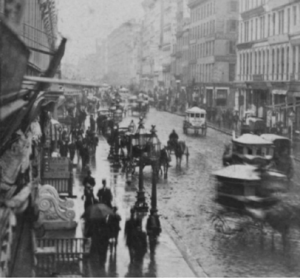
Broadway Looking North From Broome Street On A Rainy Day in the 1870s.
“Is anything wrong with it?” they asked.
“Yes,” said the clerk, handling the gun with the precision of a skilled operator. “Something is the matter with the half-cock, but I will make it alright in a moment.”
The clerk ran downstairs to the workshop, and returned a minute or two later.
“It is all right now,” he said, handing the men the revolver. “The line hair spring that controls the half-cock was broken; here it is,” he said, handing them the broken spring.
This satisfied Castle’s curiosity as to “John’s” fooling with the pistol. They returned the weapon with a note, thanking Blavatsky for her courtesy, by the hands of a messenger boy.[16]
Judge also conducted an experiment of his own to test Blavatsky. Taking an ancient scarabaeus that was in his possession, he had it wrapped up and sent to her through the mail by a clerk in the employment of a friend. He left no indication that it was from him, nor was he entirely sure where it was sent from nor what day.[17]
SOURCES:
[1] Judge, William Q. “A Servant Of The Masters: Col. Henry S. Olcott.” The Path. Vol. III, No. 1 (April 1888): 8-12; “Fifteen Years Ago.” The Path. Vol. V, No. 9 (December 1890): 272-274; Judge, William Q. “H.P.B. A Lion-Hearted Colleague Passes.” The Path. Vol. VI, No. 3 (June 1891): 65-68; “Historic Theosophical Leaves.” The Path. Vol. IX, No. 1 (April 1894): 1-3; Judge, William Q. “The Theosophical Society.” The Path. Vol. X, No. 2 (May 1895): 55-60.
[2] Siddall, J. W. Men Of Hawaii: Vol. II. Honolulu Star-Bulletin. Honolulu, Hawaii. (1921): 85; Sinnett, Alfred Percy. Incidents In the Life of Madame Blavatsky. G. Redway. London, England. (1886): 186-199; Judge, William Quan “Yours till Death and After, H.P.B.” Lucifer. Vol. VIII, No. 46 (June 15, 1891): 290-292. [Castle, Richard.] “Days With Mme. Blavatsky.” The Hawaiian Gazette. (Honolulu, Hawaii) October 19, 1894.
[3] A.L.P. “With H.P.B. In The Seventies” Theosophy Vol. XI., No. 5. (August 1896): 150-153.
[4] Irma and Paul Milstein Division of United States History, Local History and Genealogy, The New York Public Library. “Manhattan: Irving Place – 17th Street” New York Public Library Digital Collections.
[5] Wiggin, James Henry. “Rosicrucianism In New York.” The Liberal Christian. (New York, New York) September 4, 1875.
[6] “Obituary: Charles Sotheran.” The Publishers’ Circular. Vol. LXXVII, No. 1,882. (July 26, 1902): 75.
[7] Ransom, Josephine. A Short History Of The Theosophical Society. Theosophical Publishing House. Adyar, India. (1938): 83, 114.
[8] Cooper, Laura M. “How She Left Us.” Lucifer. Vol. VIII, No. 46. (June 15, 1891): 267- 271.
[9] C. “Days With Mme. Blavatsky” Hawaiian Gazette. (Honolulu, Hawaii) October 19, 1894.
[10] W.Q. Judge writes: “On that first evening I brought with me a friend, a perfect stranger to her. He was a native of the Sandwich Islands, who was studying law in New York, and who had formed all his plans for a lifelong stay in that city. He was a young man, and had then no intention of marrying. But she carelessly told him, before we left for home, that before six months he would cross the continent of America, then make a long voyage, and, stranger yet to him, that before all of this he would marry. Of course the idea was pooh-poohed by him. Still fate was too much for him. In a few months he was invited to fill an official position in his native land, and before leaving for that country he married a lady who was not in America at the time the prophecy was uttered.” [Sinnett, Alfred Percy. Incidents In The Life Of Madame Blavatsky. G. Redway. London, UK (1886): 186-199.]
[11] Siddall, J. W. Men Of Hawaii, Vol. II. Honolulu Star-Bulletin. Honolulu, Hawaii. (1921): 85.
[12] C. “Days With Mme. Blavatsky” Hawaiian Gazette. (Honolulu, Hawaii) October 19, 1894.
[13] Judge writes: “I found my secret thoughts read, my private affairs known to her. Unasked, and certainly without any possibility of her having inquired about me, she referred to several private and peculiar circumstances in a way that showed at once that she had a perfect knowledge of my family, my history, my surroundings, and my idiosyncrasies.” [Sinnett, Alfred Percy. Incidents In The Life Of Madame Blavatsky. G. Redway. London, England. (1886): 186-199.]
[14] It is possible that Alfred C. Chapin was also present. The future mayor of Brooklyn used to attend meetings with Blavatsky when he was a young lawyer, and “derived much instruction from her for a time.” [Thompson, Daniel Greenleaf. “They Fooled Blavatsky.” The Pittsburgh Dispatch. (Pittsburgh, Pennsylvania) March 30, 1890.]
[15] “Delafield Smith’s Defence.” The New York Daily Herald. (New York, New York) March 1, 1875; “The Best Breech-Loading Rifle In The World.” The American Agriculturalist. Vol. XXXIV, No. 11 (November 1875): 436.
[16] C. “Days With Mme. Blavatsky” Hawaiian Gazette. (Honolulu, Hawaii) October 19, 1894.
[17] Sinnett, Alfred Percy. Incidents In The Life Of Madame Blavatsky. G. Redway. London, England. (1886): 186-199.


